A World Bank official underlined recently the essential role China plays in boosting development with infrastructure investments and recognized the potential of its domestic market to drive the global economic recovery.
"It's important that we see the significance of China's domestic market as an engine of growth for other countries," said Martin Raiser, the World Bank's country director for China, at the seventh China and Globalization Forum in Beijing on July 30.

Martin Raiser, the World Bank's country director for China, speaks at the seventh China and Globalization Forum in Beijing on July 30. [Photo courtesy of the Center for China and Globalization (CCG)]
Raiser stressed that China should see itself as a motor of consumption and international demand, in a bid to better contribute to the global economic recovery. "This will serve an important purpose particularly for many emerging markets," he added.
China has been putting major effort into developing its domestic market since it introduced a "dual circulation" development paradigm last year. According to the country's 14th Five-Year Plan (2021-2025) for National Economic and Social Development and the Long-Range Objectives Through the Year 2035, China will advance the building of a strong domestic market and a strong trading nation in a concerted way, based on domestic circulation.
This strategy has proved effective. Earlier in June, the World Bank upgraded China's growth forecast to 8.5% in 2021, up a 0.6 percentage point from the previous projection. In the meantime, the global economy is expected to expand 5.6%, 1.5 percentage points higher than the previous projection.
The strong rebounds in China have largely been supported by its infrastructure investments, so Raiser hoped the World Bank, the Asian Infrastructure Investment Bank (AIIB), and the Asian Development Bank (ADB) could collaborate on infrastructure projects in other countries.
According to Raiser, over the past 40 years, China has significantly improved its domestic social and environmental standards, meanwhile enhancing the planning and economic analysis of infrastructure projects.
"As a result, China has been a huge beneficiary of its own investment and infrastructure. This experience, we now need to bring together to other countries," he said, referring to China's commitment to building the capacity and adhering to international good practice standards, instead of simply providing capital. As China develops its own economy towards a greener and most sustainable path in line with its carbon neutrality goal by 2060, this will provide big technical opportunities for many other countries to learn from, Raiser noted.

Chen Deming, former Chinese minister of commerce, speaks at the seventh China and Globalization Forum in Beijing on July 30. [Photo courtesy of the CCG]
"There are many regions across the world that require the attention from both developed countries and emerging economies," said Chen Deming, former minister of commerce at the forum.
Chen believed that investing in infrastructure projects in less-developed countries could be a win-win approach which would not only help drive their economic growth, but also solve the issue of overcapacity in developed countries.
He noted that developed and emerging economies and developing countries should reach consensus regarding the formulation of investment standards and international rules in the fields of infrastructure construction.







